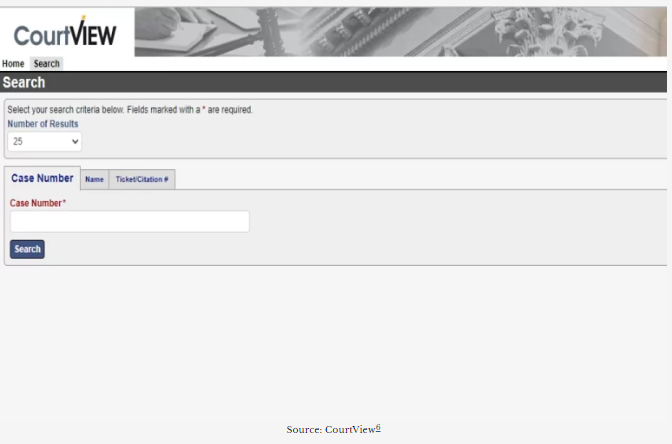Alaska State Records & Public Information: Free Search Guide
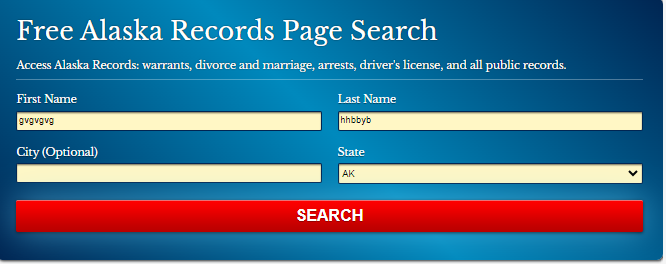
An Overview of AK Criminal Records
In the state of Alaska, the Alaska Public Records Act, specified in Alaska Statutes AS 40.25.100 — 40.25.295, grants public access to numerous state records. However, the accessibility of certain records may vary, with some being more challenging to obtain than others.
The aim of this act is to facilitate the accessibility of public records to the general populace. Despite this intention, there are limitations that govern specific records within the state or jurisdiction. Nevertheless, by utilizing the resources outlined in this guide, individuals can effectively narrow down their search and be well-equipped to access public information through various databases provided by the state of Alaska.
An Overview of AK Criminal Records
Alaska criminal and arrest records serve as valuable resources for obtaining information about individuals in various contexts such as employment, neighborhood safety, or verifying the existence of arrest warrants.
Criminal records in Alaska typically include details such as:
- First and last name
- History of past crimes or charges
- Existence of warrants
- Court orders
- Arrest records and records of dropped charges
These records are typically sourced from court documents, background check services, public offender registries, and other state-provided public databases.
Are Alaska (AK) Criminal Records Open to the Public?
Alaska Statute 12.62.160 dictates that criminal records can be disclosed to any individual and for any purpose unless they pertain to non-convictions or correctional treatment information. However, certain categories of records, such as juvenile records, sealed records, expunged cases, and records subject to protective orders, remain private.
How to Search Criminal Records & Criminal History in Alaska
To access criminal records in Alaska, individuals must follow a specific process through the Department of Public Safety (DPS). Here’s how to proceed:
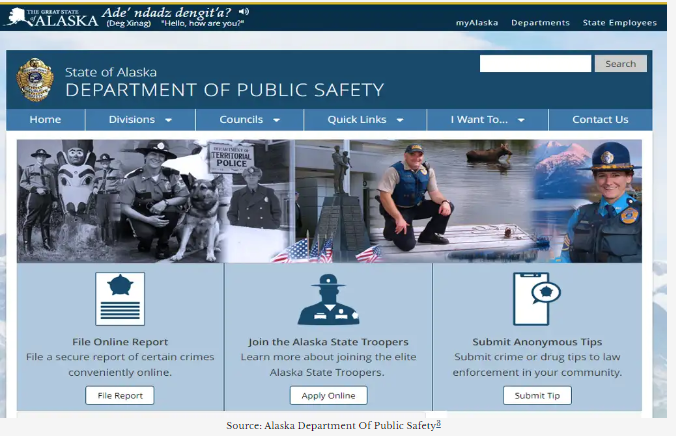
Determine the Relevant Department: Identify the appropriate governmental section or detachment within the Alaska Department of Public Safety (ADPS) where the records are maintained. This may include entities such as the Commissioners Office, Alaska State Troopers (A-D Detachments), Alaska Bureau of Investigation (ABI), Anchorage Judicial Services, or Alaska Wildlife Troopers (Northern and Southern Detachments).
Submit a Request for Search: Obtain and complete the “Request for Search” form, available through the DPS. Follow the instructions provided by the Public Information Office to submit the request online. Alternatively, requests can be made via mail or fax, ensuring the inclusion of the required form and payment.
Accessing Records Online: Utilize the Alaska Department of Public Safety’s online records search page to conduct a free warrant search, access inmate information, obtain criminal history details, and file online reports.
In-Person Requests: Visit any designated location listed by the DPS to request criminal records in person. Additional copies of reports can be obtained for a fee of $5 per copy, provided they are requested simultaneously.
Contact Information: For further inquiries or assistance, individuals can reach out to the DPS via email at dps.criminal.records@alaska.gov or by phone at 907-269-5767.
How to Request a Background Check Through the State of Alaska
Background checks in Alaska are facilitated through the Criminal Records and Identification (R&I) Bureau of the Department of Public Safety. Follow these steps to request a background check:
Choose the Type of Search: Decide whether to opt for a name-based search ($20) or a fingerprint search ($35, excluding fingerprinting fees).
Employer and Facility Checks: Employers and facilities licensed by the Department of Health & Social Services can conduct pre-employment background checks through the New Alaska Background Check System (NABCS) portal.
Utilize the NABCS Portal: Licensing agencies can use the NABCS portal to process applicant background checks efficiently. Any issues or queries regarding this system can be addressed to BCUnit@alaska.gov or by calling (907)-334-4475.
Applicant Initiated Process: Individuals can request a background check on themselves through the “applicant initiated process.”
Restrictions on Personal Checks: Alaska’s background check laws prohibit individuals from obtaining background checks on others without their consent. However, third-party aggregate services may provide access to arrest records, criminal history, bankruptcies, and other public information for personal use.
To determine if an individual has an outstanding warrant in Alaska, there are several methods available:
Active Warrant List: Check the centralized Active Warrant List issued by the Alaska State Court System specifically for Alaska State Trooper (AST) cases. This list covers warrants issued by state troopers. However, for a comprehensive search, it’s advisable to also contact the local police department or county sheriff’s office.
Alaska Sex Offender Registry
Alaska mandates that sex offenders and child kidnappers register on the state’s sex offender registry, as per AS 18.65.087. Here’s how to access this information:
Online Search: Utilize the state’s sex offender registry to search for individuals by name, zip code, or address. Additionally, an interactive map is available for residents to check their specific city or neighborhood.
National Sex Offender Registry: Alternatively, access information on sex offenders through the national sex offender registry, which may offer a different user interface.
Alaska Court Records & Judiciary System
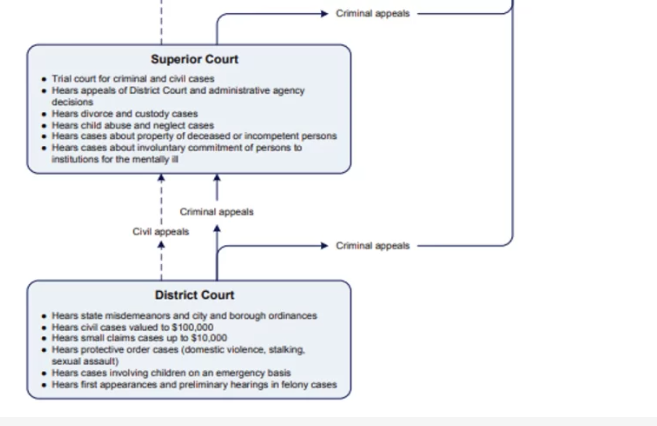
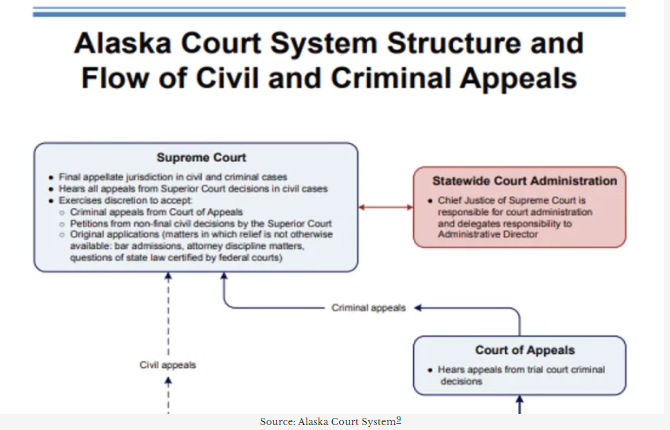
Alaska’s court records provide valuable insights beyond criminal records, encompassing civil cases and various legal matters. Here’s how to access these records:
Court Records Search: Explore court records to gain information on civil cases, criminal proceedings, bankruptcy filings, estate records, probate records, and criminal convictions.
Understanding the Court System: Familiarize yourself with the Alaska Trial Courts, where hearings typically commence. For cases proceeding beyond this level, understanding the structure of the court system is essential.
Alaska Trial Courts: District Courts and Superior Court
In Alaska’s judicial system, trial courts are divided into District Courts and Superior Courts, each with distinct jurisdictions:
District Courts
District Courts in Alaska handle the following types of cases:
- Misdemeanors: Prosecution of state, city, and town ordinance violations classified as misdemeanors.
- Civil Cases: Adjudication of civil disputes valued at up to $100,000.
- Small Claims: Resolution of small claims disputes involving amounts up to $10,000.
- Protective Orders: Hearings related to protective orders for domestic violence, sexual assault, and stalking cases.
- Emergency Cases Involving Children: Matters concerning children that require immediate attention.
- First Appearance Felony Cases: Initial appearances for felony cases and preliminary hearings.
Superior Courts
Superior Courts in Alaska handle a broader range of cases, including:
- Civil and Criminal Cases: Adjudication of both civil and criminal matters.
- Appeals: Review of appeals from District Court decisions.
- Administrative Agency Decisions: Review of decisions made by administrative agencies.
- Family Law Matters: Handling of custody and divorce cases.
- Child Negligence and Abuse: Proceedings related to cases of child neglect and abuse.
- Estate Matters: Management of property belonging to incompetent or deceased individuals.
- Mental Health Commitments: Hearings regarding involuntary commitment and institutionalization of the mentally ill.
Appellate Courts
Appellate Courts, including the Supreme Court of Alaska, serve as the next level of appeal for cases heard in the trial courts:
- Jurisdictions: Appellate Courts have various jurisdictions, with the Supreme Court primarily overseeing appeals.
- Clerks and Administrators: Each Appellate Court has its own clerks and administrators.
- Supreme Court: The Supreme Court serves as the final appellate jurisdiction, primarily handling criminal and civil cases. However, only a small fraction of cases advance to this level.
- District Court Search: The majority of Alaska Court Records can be accessed through the District Court Search tool. This platform enables users to locate records by conducting searches based on name, case number, or ticket citation number.

- 1. Access District Court Records: Utilize the District Court Search tool to find court records related to various legal matters.
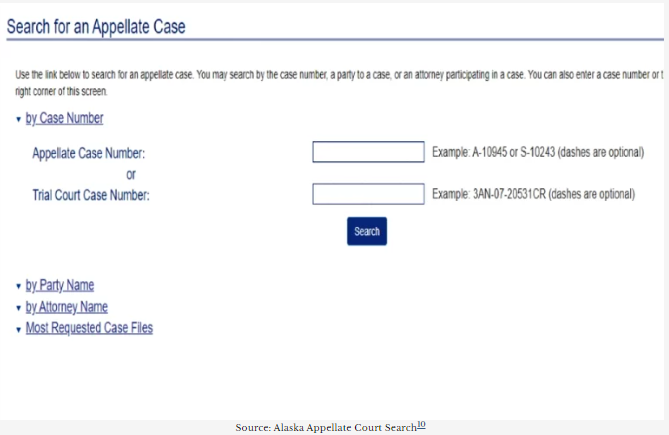
- Search Options: Conduct searches by entering the individual’s name, case number, or ticket citation number.
- Alaska Appellate Court Search: For cases that have been appealed to the Supreme Court, utilize the Alaska Appellate Court Search tool.
- Access Appellate Court Records: Navigate to the Alaska Appellate Court Search platform to access records related to cases that have reached the Supreme Court.
- Filter Options: Refine your search by using filters such as case number, name search, attorney name, and highly requested case files.
- Alaska Vital Records Explained: How to Find Marriage Records
- Alaska’s Department of Health & Social Services provides access to vital records, including marriage certificates, which can be obtained through the following process:
- Access Vital Records: Visit the Department of Health & Social Services website to access vital records.
- Types of Vital Records: Vital records include certificates of birth, death, marriage, and divorce. Additionally, Alaska offers certificates for stillbirths, veteran deaths, heirloom births, and weddings.
- Obtain Marriage Records: To obtain marriage records, navigate to the appropriate section on the Department of Health & Social Services website and follow the instructions provided.
- Additional Assistance: For further assistance or inquiries regarding vital records, individuals can contact the Department of Health & Social Services directly.
Accessing Vital Records in Alaska
Vital records, including birth, death, marriage, and divorce certificates, are essential documents that can be accessed in Alaska through various means:
Public Access: Vital records in Alaska are considered public information, but access is restricted to certain individuals, including the subject, select family members, and legal representatives within specific timeframes.
Third-Party Search Sites: Despite restrictions, third-party search sites offer alternative means to access vital records in Alaska without the same limitations as state sources.
Timeframes for Access: Access to vital records in Alaska is subject to specific timeframes:
- Birth certificates: Accessible to the public 100 years after birth.
- Death certificates: Available 50 years after the death.
- Marriage and divorce certificates: Accessible to the public 50 years after issuance.
How to Obtain Vital Records
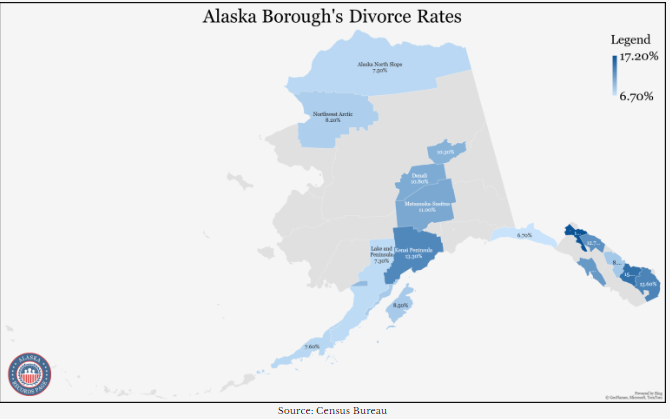
VitalChek: Vital records can be swiftly obtained through VitalChek, an online service contracted by Alaska. Each record typically costs $40.
Division of Public Health (DPH): Alternatively, individuals can fill out birth, death, marriage, and divorce forms and submit them to the Division of Public Health (DPH) by mail or fax for $30 per certified copy.
In-Person Requests: In-person requests can be made at Vital Records Offices located in Anchorage and Juneau.
Acceptable Forms of Identification: Requests for vital records must be accompanied by acceptable forms of identification, including a driver’s license, state-issued ID, school ID, tribal or BIA card, military ID, or passport.
Finding Alaska Inmates & Associated Records
Locating Inmates in Alaska:
VINE (Victim Information and Notification Everyday): Use the VINE inmate lookup tool, which hosts custody records for the State of Alaska and municipal detention facilities.
Contacting Authorities: If VINE doesn’t yield results, contact the local police department or correctional facility for information on detained individuals.
Visiting Correctional Facilities: Contact individual correctional facilities in Alaska or the Department of Corrections for visitation procedures.
Sending Money to Inmates: Money can be sent to Alaska prisoners through various methods, including MoneyGram, Western Union, or USPS via money order.

